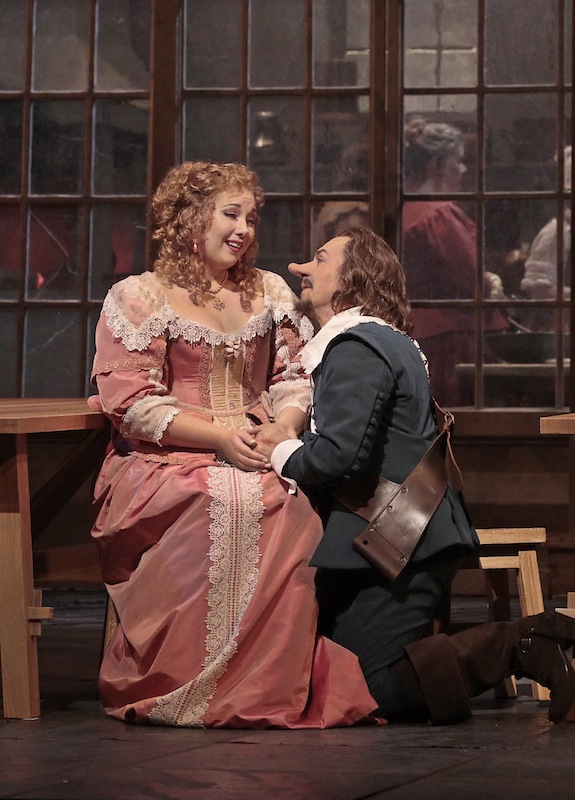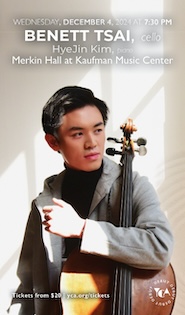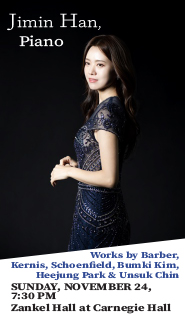Alagna and Rowley bring emotional depth to Met’s “Cyrano de Bergerac”

Roberto Alagna in the title role and Jennifer Rowley as Roxane in Alfano’s “Cyrano de Bergerac” at the Metropolitan Opera. Photo: Ken Howard
To say that Cyrano de Bergerac is an unusual item at the Metropolitan Opera would be gross understatement. It took until 2005 for Franco Alfano’s 1936 opera to enter the company rep, with Plácido Domingo in the title role. A second run began Tuesday night and proved to be a surprise gem in the closing weeks of the season.
Alfano’s music is not especially edgy for its time, yet it is varied and individual in character—an appropriate fit for the tragicomic tale of the dashing poet who woos the woman he loves on behalf of a better-looking friend. Alfano shows flashes of modernism, especially early on, as spacious, playfully dissonant tonality and glittering orchestration set a fanciful mood; in the most crucial moments, though, Alfano reveals himself to be a late Romantic at heart, giving the singers achingly lyrical melodies and accompanying them with rich swells of strings.
It was in these moments that Roberto Alagna shone brightest in the title role. In the early going, he showed an unusual tendency to shout, spreading at the top and not finding much ease or nuance in his high-lying first aria, the dueling ballad “Je jette avec grâce mon feutre.” He came into his own for the spellbinding balcony scene of Act II; as he woos the beautiful Roxane while pretending to be his friend Christian, Alagna found his best ringing tone in the scene’s passionate heights, contrasting that brilliance with soft pining. Alagna’s Cyrano was a beautiful portrayal of a man struggling to keep up his outward flair while tormented by his inability to pursue his love.
Tuesday was a breakout night for the young American soprano Jennifer Rowley, who was enchanting as Roxane, overflowing with innocent exuberance. She brings to the role a voice of considerable weight, from which she can draw out an array of different colors–early on there was an enticing, smoky quality to her singing, as she fended off romantic suits from all the society men of Paris. Once alone on her balcony singing to her beloved Christian (or so she thought), she showed a cool, clear soprano with a penetrating top. From glowing debutante to soft-spoken widow, her arc was beautifully crafted.
One important element of the opera, making that balcony scene possible, is the presence of a second tenor who wins Roxane’s love by letting Cyrano lend him his voice. In the role of the young cadet Christian, Atalla Ayan showed a tenor a shade darker than Alagna’s, but convincingly played the youthful passion of the tongue-tied, starry-eyed lover.
A host of supporting roles fill out the busy world of Cyrano, chief among them the haughty military commander De Guiche, whose petty jealousy leads him to put Christian and Cyrano in as much danger as he can find. Juan Jésus Rodríguez displayed a rich, wooly baritone in the role, and actually managed to find a certain humility in spots, coming off as surprisingly sympathetic in his one extended protestation of love to Roxane.
As the guard captain Carbon, Michael Todd Simpson projected rough confidence and sang with a robust, fine-grained baritone. Roberto de Candia was endearing as the befuddled pastry chef Ragueneau, petty tyrant of a charming pâtisserie, while David Pittsinger’s oaken bass-baritone was a strong fit for Cyrano’s friend Le Bret, the picture of reserved nobility. Tony Stevenson and his claxon-like tenor had a moment to shine as the humiliated actor Montfleury. And Jennifer Roderer made a fine debut as Roxane’s harried governess.
Francesca Zambello’s 2005 production, is a perfect match for this curious piece. Colorful period costumes by Anita Yavich and beautifully stylized sets by Peter J. Davison give the opera a storybook feel that brings to life the flamboyant whimsy of the first two acts, yet that folk-story charm makes the tragic turn of acts III and IV all the more affecting, as emotional desperation begins to strain against the picture-perfect setting.
Marco Armiliato’s direction from the pit was satisfactory, though rarely anything more. The orchestra’s finest moments were instrumental solos, as in the ravishing cello solo as Christian struggles to find the right words before the balcony scene. Though he managed to weave some lovely colors here and there—to say nothing of the shatteringly gorgeous moaning chorus of the soldiers in Act III—much of his reading was flat, especially in Act I, where the score calls for wit and fanciful imagination.
That dryness from the pit, as well as a certain noncommittal approach from the actors early on—Alagna spent much of the first scene fussing with an uncooperative cloak—meant that little of the piece’s humor landed with much force, and the opera read more as a straight tragedy than as classical romance. Yet in those tragic depths, the actors found more than enough emotional weight to grip the audience: Cyrano and Roxane’s final moments together were as unbearably moving as any of the familiar heart-rending conclusions in the verismo canon. Once the cast has a few performances to find their comic chops, the dramatic contrast should make those closing bars even more crushing.
Cyrano de Bergerac runs through May 13 at the Metropolitan Opera. metopera.org


